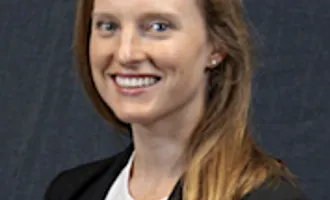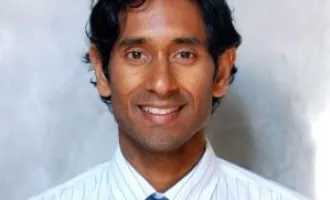
The Closest Thing UCSF Has to a Football Game: Students compete in Grad Slam
Over a hundred people squeezed into a packed auditorium Thursday, for what has been called “the closest thing UCSF has to a football game,”the UCSF Grad Slam competition. This is the second year UCSF graduate students have competed for the chance to present their research to a general audience - in three minutes or less.
In assemblyman and South San Francisco mayor Kevin Mullen’s opening remarks he emphasized the importance of communicating science to lay audiences: “think of yourself and your talks here today as a window into the exciting research that goes on here at UCSF. Without that window, many people will never see the great things that happen here and won’t appreciate how important it is. UCSF is and always has been a key force in growing the Bay Area’s reputation as a hub of innovation and progress. Efforts like Grad slam help nurture and solidify that reputation.”
Ten finalists delivered their bite-sized, jam-packed talks to the panel of judges and a live audience. They competed for three prizes: a grand prize of $3,000 and runner-up prize of $1,500, and a “people’s choice” award of $750, chosen by the audience’s vote.
Shannon Smith-Bernardin, from the Nursing PhD program, took home the grand prize for her talk on her health-services research investigating alcohol-intoxication sobering centers. The centers, which currently exist in 20 states, provide urgent care specifically for people with alcohol-intoxication as an alternative to the Emergency Department, alleviating issues of emergency room overcrowding and limited resources. Despite the growing number of sobering centers across the country, data on their safety and cost-efficacy was lacking. Smith-Bernardin’s research on the San Francisco sobering center found that the small facility saved the system over 3.5 million dollars in eight years, while safely providing care in over 30,000 encounters.
For Smith-Bernardin, competing in the Grad Slam was an opportunity to share her passion with a general audience that was unfamiliar with her work. “I’ve worked in San Francisco for the Department of Public Health for ten years now as a registered nurse, and I am very familiar with sobering centers, but not a lot of people are,” she said. “I want to be able to share sobering centers [with others]. I find it fascinating.” As the first-place winner, Smith-Bernardin will represent UCSF in the UC-wide Grad Slam competition later this year.
The second place prize went to Shaun Abrams, from the Oral and Craniofacial Sciences program, for his talk about cilia and its role in the development of craniofacial defects like cleft lip and palate. He likened cilia to a cell’s antenna, which, when broken, results in reduced signaling and leads to facial defects. In his graduate research in Jeremy Reiter’s lab, Abrams elucidated the mechanism by which this happens and found a way to prevent the formation of the defect. “These exciting results give us new insight into how cells use their antenna to communicate and bring us one giant step forward in the hopes of translating these results from the mouse to the human,” he concluded.
Mihir Vohra, from the neuroscience program, won the “people’s choice” award for his talk about the relationship between eating and learning. In most animals, including the worms that Vohra studies, reduced eating leads to improved learning.
However, Vohra discovered a gene mutation that turns his worms into “super-learners.” “[The worms] learn as well as if they had been on a diet, but while eating as much as they want,” he explained. “That sounds like the dream, right?” The mutation Vohra discovered targets a metabolite that is released from food.
Normally, this metabolite binds directly to brain cells, ultimately inhibiting learning, but in the presence of the mutation, the function of the metabolite is disrupted. “This one little metabolite... is actually a major connection between metabolism and general brain function, explaining how what goes into our bellies controls what goes on in our brains, ” Vohra explained.
The judges included UCSF chancellor Sam Hawgood, Dean of the School of Medicine Talmadge King, science journalists Gabriela Quirós and Indre Viskontas, and Director of the Bay Area Science Festival, Kishore Hari.
The other finalists that competed were: Roman Camarda (Biomedical Sciences, BMS), Sonia Rab Alam (Sociology), Thomas Roseberry (Neuroscience), Meera Shenoy (BMS), Melissa McCreery (BMS), Zairan Liu (Biophysics), and Louise Goupil (Chemistry and Chemical Biology).
#UCSFGradSlam


